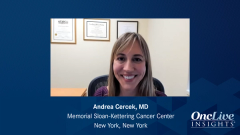
The Future of Molecular Testing in Colorectal Cancer
A look at how the molecular testing landscape in colorectal cancer is evolving.
Episodes in this series

Andrea Cercek, MD: How do you see the molecular testing landscape changing in the future?
Jaclyn Hechtman, MD: We’re going to see an increase in how much comprehensive genomic testing we’re doing: a lot more NGS [next-generation sequencing] in the future as we get these rare targets. Only a few colon cancers here and there are having NTRK fusions, and 3% to 5% are having HER2 implications. But then patients get drugs that are less toxic and that are effective, and they prolong their lives and improve the quality of their lives. We’re going to see an increase in these comprehensive tests. We’re also going to see a lot of increases in ctDNA [circulating tumor DNA] testing. In the earlier stages, we’re using it for MRD [minimal residual disease], but in the future we may start looking for targets in ctDNA. Possibly even in earlier stage I disease, depending on how patients with these biomarkers do, especially if they’re at high risk if they do MRD. Maybe we’ll see if DNA will start looking for these targets.
Andrea Cercek, MD: It’s great that you brought up circulating tumor DNA or cell-free DNA and how we use it in general in oncology. Specifically in colorectal cancer, MRD is important because we want to know if there’s any residual microscopic disease that we can act on. It’s a challenge because we have this tool to detect the ctDNA, but we don’t always have the tools to act on it, or we rarely do. Only certain drugs work for microscopic colorectal cancer, so if a patient still has positive circulating tumor DNA or evidence of MRD, how do we act on that? That remains a huge challenge where this technology is important. As you said, we’re going to learn. We’re doing a lot of trials, so we’re going to learn, and our therapies will improve. Little by little, with some of these targeted interventions, we’ll probably make a difference and be able to eliminate that microscopic disease or that minimal residual disease that’s detected by ctDNA. At the moment, it’s great if it’s negative; everybody is happy. But if it’s positive, sometimes it’s challenging because we don’t have the tools to treat it better, so it will definitely be a very important tool in the treatment of metastatic colorectal cancer.
Jaclyn Hechtman, MD: As we do that, a lot of these ctDNA tests are custom for each patient and are using specific alterations in the tumor to detect MRD. But those tests often don’t tell you what was in the tumor. Once the technologies get better, we’ll be able to reliably say if this is a targetable alteration in the tumor, there is MRD, and how much of that target is circulating, and then track that as we go. Of course, not all of these patients are having something targetable, but as the number of targets increase, we can hope for more of that.
Andrea Cercek, MD: Exactly.
Jaclyn Hechtman, MD: How are you using ctDNA when you’re treating patients in your practice?
Andrea Cercek, MD: We have several clinical trials that are monitoring ctDNA as a marker of minimal residual disease of response to therapy. I’m very excited to learn more about those results. Some cooperative group trials are asking these same questions: how ctDNA guides our adjuvant or postoperative therapy, and does it make a difference for our patients? I utilize it in that way in clinical trials.
In the absence of a clinical trial and routine practice, many patients come with ctDNA being done. I’m not against using it, but I refer to it often as a fancy CEA [carcino embryonic antigen]. We have CEA that we’ve been using for a long time. It’s reliable in some patients; it’s not reliable in others. If the CEA increases over time, but I don’t see any radiographic evidence of disease, I don’t have the tools to act on it, so I’d wait. That’s very similar to my approach with ctDNA, but it causes a bit more anxiety.
Sometimes it’s a bit of a challenge, although it will be a really important tool once we have better treatment options. In some people, it’s more reliable than in others. We’re learning on some of these trials that it’s dependent on the assay and that it’s not as easy to interpret. It’s not black and white. There’s sometimes background noise. Some assays are certainly much better than others. There’s still a lot of learning that we need to do about ctDNA, but it will definitely become part of our treatment algorithm for metastatic colorectal cancer in the future.
Transcript edited for clarity.






































